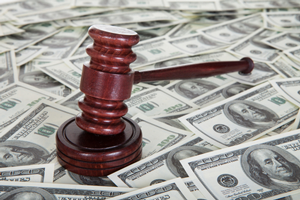 When we talk about garnishment, we are referring to the legal order given by a court to an creditor or debt collector -individual or business- (the plaintiff), to obtain monetary judgement from the debtor (defendant). The money not always comes directly from the debtor, in some cases it does, in other cases it come from a third party, it is usually a court decision.
When we talk about garnishment, we are referring to the legal order given by a court to an creditor or debt collector -individual or business- (the plaintiff), to obtain monetary judgement from the debtor (defendant). The money not always comes directly from the debtor, in some cases it does, in other cases it come from a third party, it is usually a court decision.
There are two types of garnishments:
- Wage Garnishment: creditors can legally request from your employer part of your wages, in order to pay off your debts. Garnishment is usually applied to the disposable income, in wages disposable income is the amount left after the deductions like social security and taxes. This type of garnishment has some restrictions depending on the type of debt like child support, taxes, student loans, credit card or medical bills, personal and other consumer loans.
The worst part of this type of garnishment is your employer is now aware your financial difficulties and embarrassing inability to pay your debts.In the State of Florida nonexempt wages can be garnished up to 25% of the gross pay, if the wages meet a minimum threshold; in this case 25% of the paycheck would go directly to the creditor on a regular basis until the debt is fully paid. - Non Wage Garnishment: also referred as bank ley, creditors can tap directly into your bank account or other assets. The creditor can garnish, or freeze your entire bank account or any account that has your name on it, until you pay the debt. Creditor can also obtain possession of your vehicle or any paid off assets you own.
Bank levies and garnishments do not require the creditor to notice you (other than through final judgement) or tell you prior to the garnishment. Therefore you may wake up one morning and all your bank accounts may be frozen.
After you have been sued by a creditor, the court notifies you and your employer, or other parties involved of your debt situation that you are in default. This will be an embarrassing situation for you, especially because creditors arrive to this stage when they have exhausted all the other options to collect their money. This is their last option. If you are at this stage, your credit rank has dropped. Filing bankruptcy prior to garnishment allows you to better control your assets and stops embarrassing and disruptive garnishments of your wages and bank accounts.
You have rights, for what the best you can do is to hire an attorney for advice, especially if you think you have to dispute an inaccurate notice or the notice shows errors. An attorney would guide you to pick the options have with your creditors. Call us today!
